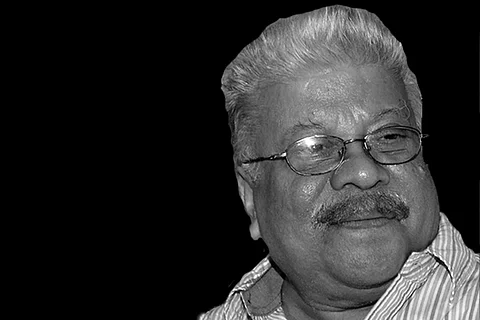

In life as in his writings, Punathil Kunjabdulla was not a man to mince words or stick to the beaten path.
The well-known Malayalam writer passed away at the age of 77 in Kozhikode on Friday morning after a long bout of illness.
Affectionately known as Kunjikka, the Sahitya Akademi Award-winning author was as well-known among Malayalam readers for his incisive writings on the Muslim community in Kerala as for his candid opinions on religion, marriage and relationships.
Kunjabdulla, who began writing short stories in childhood, wrote over 45 books through his long and rich career, including seven novels, 15 short story collections, memoirs, travelogues and an autobiography titled Nashtajathakam.
Of his many works, Smarakasilakal was the crown jewel. Set in the north Kerala village of Ooralunkal in Madappally, the novel tells the story of Khan Bahadur Pookkoya, the head of a feudal family, and the patriarchal structure at work within the family. Published in 1977, the book remains a classic of modern Malayalam literature till date. Smarakasilakal won the Kerala Sahithya Akademi Award in 1979 and the Kendra Sahitya Akademi in 1980. His anthology of 11 short stories titled Malamukalike Abdulla, won the Kerala Sahitya Akademi award in 1980.
Trained as a doctor, Kunjabdulla also wrote about the unspoken side of his profession in Marunnu, which examines questions of death and the ethics of medical science through a tale of the lives of medical students. His Paralokam also picked up on themes of death, another novel richly informed by his own life experiences as a doctor.
Aligarh, where he studied for his Bachelor’s degree in Medicine featured as the site for many of his stories.
A modernist writer, one of the highlights of Kunjabdulla’s work is the way he wrote his female characters. Like Pookunjeebi in Smarakasilakal many of his female characters were strong personalities, who did not shrink from expressing their desires, and were a troubling experience for more conservative members of his readership.
Though a master at richly detailing his characters and the landscape in which he moved, Kunjabdulla made sure that his writing style always remained simple and accessible. Though an avowed modernist, Kunjabdulla’s work reached a much wider audience thanks to his inimitable style.
Noted writer and critic George Onakkoor, for instance, told TNM, “We traveled in parallel paths, he was a man of modernism and I am not. But it was a great pleasure to read his works like Marunnu, Aligarh Kathakal and Kathi, to name a few. His humorous style in some of his work was unique. He contributed enormously to modernism in Malayalam literature along with Sethu, OV Vijayan, Anand and Zacharia.”
Hailing from Kozhikode, a haven for artists of all kinds, Kunjabdulla benefitted from friendships with many renowned figures of Kerala's social and cultural life like Vaikom Muhammed Basheer, NP Mohammed, UA Khader, MV Devan, and Artist Namboothiri, to name a few.
He considered MT Vasudevan Nair, the doyen of Malayalam literature, as his guru. Humour was a major part of Kunjabdulla’s life too.
As Kerala Chief Minister Pinarayi Vijayan wrote in his condolence message, "He communicated in the language of the layman to his readers. He had the magic of making people read whatever he wrote. He viewed life through a cartoonist's eyes. There was warmth behind his humor."
Edited by Rakesh Mehar